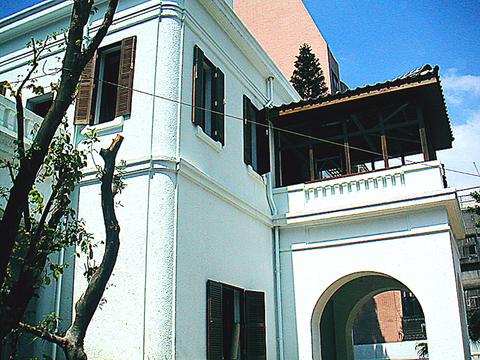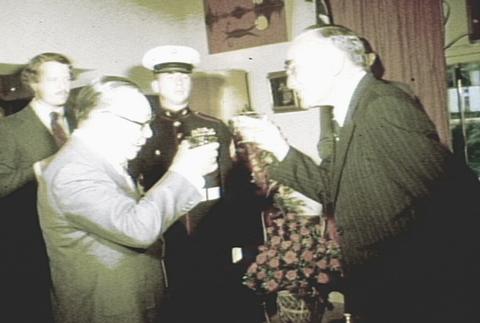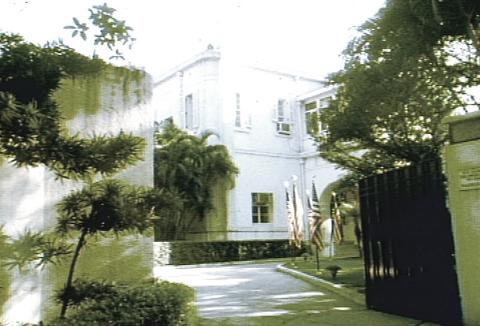Fifty years ago Chen Lien-heng (
"The ambassador's residence was so mysterious. I could never tell what was going on in there behind the walls," Chen said. "And, whenever the ambassador had important guests, the local police would come to my house and spy on his residence from my roof. The police would come around so often that it was as if they lived in my house," he said.
The years passed and there would be parties at the ambassador's mansion with elegant classical music in the house and qipao-clad women admiring the the art collection.

PHOTO COURTESY OF SPOT-TAIPEI FILM HOUSE
Aboriginal activist Hu De-fu (
The American ambassador's residence was built in 1901 by the Japanese. Throughout the century the nearly 2,000 square meter mansion was a focal point for celebrity, political and cultural life in Taipei. Originally an office building during the Japanese occupation, it later served as the American consulate building before the outbreak of World War II. After the war it was home for six American ambassadors. But the house has been empty since 1979, when the US broke diplomatic relations with Taiwan.
In 1997 the Taipei City Government, which was legally entitled to the rights to use the building, designated the former ambassador's residence as an official historical historic site and began to restore it, with the intention of turning it into an art salon. But the central government, which owned the property on which the mansion stood, wanted it to become a diplomatic museum instead. As a result of the disagreement between the two governments, nothing was done until current Taipei Mayor Ma Ying-jeou (

PHOTO: CTS
But for many who remember Taipei in the 1960s and 1970s, the American ambassador's residence will always symbolize the the American presence on Chungshan N Road.
In 1951, after the outbreak of the Korean War, the US established the headquarters of the Military Assistance and Advisory Group (MAAG) nearby the ambassador's residence. The MAAG's purpose was to block the expansion of communism in Taiwan and the rest of East Asia. A large US military compound was established on Chungshan N Road, Sec 3 and there was a grocery store, a parking lot and a military police facility for the Americans at what is now Chung Shan Soccer Stadium. On the other side of the road, at what is now the Taipei Fine Arts Museum, there was a base exchange, commissary and officer's club, as well as several guesthouses and hotels.
Dale Holmgren, an American businessman who joined the American Chamber of Commerce in 1962, came to Taipei as a lieutenant in 1958. He said that at that time a large part of the area around Chungshan N Road was covered with rice paddies. The main transportation was pedicabs and people in the area used to wear coolie hats.

PHOTO: CTS
Longtime residents might recall that in those days Taipei's pedicab drivers often ate lots of garlic to maintain their energy, he said. "But the smell was unforgettable."
Yeh Wen-shan (
"When an American soldier saw us, he would take a dollar bill from his pocket and show it to us. Then we would chase him to get the money," Yeh said. "At that time US$1 was worth NT$40, which was a lot of money in those days."
"Sometimes," Yeh added, "we would see American soldiers riding around on their motorcycles and we would get really excited. We would line up in a long line, waiting for the adoa to give each of us a ride around the ambassador's house," he said.
MAAG gradually expanded and by the end of the 1960s there were more than 2,000 American servicemen in Taiwan. The US presence increased further with the outbreak of the Vietnam War, when soldiers on tours of duty in Vietnam would come to Taiwan for R&R (Rest and Recreation). From 1965 to 1972, more than 200,000 American soldiers visited Taiwan in this fashion, and Chungshan N Road, naturally developed into a hub for their activities.
"Chungshan N Road was a little piece of America in Taipei," said Hu De-fu, who sang folk songs at clubs that the Americans frequented. "You could see soldiers on leave from Vietnam strolling down the streets with bar girls in tow. And the shops were full of foreign goods from the base exchange, such as alcohol, chocolate and tobacco. At night the smell of booze and marijuana, and the shouts of drunken soldiers filled the air. And you could hear prostitutes calling out to their prospective customers in pidgin English, `You come, I go.'"
Hu added that this decadent scene wasn't appreciated by the local people.
"Not true," said Chen Lien-heng, who has lived in the neighborhood for 50 years. "The Americans brought a lot of money with them and created a booming tourist economy in the area," he said.
Indeed, according to Chen and Yeh Wen-shan, soldiers and their girlfriends used to sell goods obtained from the base exchange to neighborhood shops, making Ching-kuang Market the largest purveyor of foreign goods in Taiwan.
Mary Hsieh (
"I have fond memories of those days. The GIs were so thin, but they really ate a lot! One of them could eat 20 eggs a day," Hsieh recalls. "Foreigners now don't seem much different to me, only they don't wear uniforms anymore."
"Revisiting the ambassador's house was just like remembering old times," Hu said. "We were really influenced by the Americans. I used to listen to Bob Dylan and Joan Baez on the Armed Forces Network and it was like an awakening for me."
For Dale Holmgren, who has been here for 44 years, the house also brings back fond memories of a forgotten era in Taiwan.
As for longtime resident Chen Lien-heng, "The walls have been torn down, so I feel like I've gained an extra courtyard in front of my house," he said. "And now, I can finally see what's going on inside of the house."
What: In anticipation of its grand opening on Nov. 10, SPOT-Taipei Film House will host six free screenings of recent films per day, starting today. The screenings are from 11am to 2am, until Nov. 9.
Where: 18, Chungshan N Rd, Sec. 2, Taipei<台北市中山北路2段18號>
Telephone: (02) 2778-2991
MRT: Chungshan Station; Exit 4

On April 26, The Lancet published a letter from two doctors at Taichung-based China Medical University Hospital (CMUH) warning that “Taiwan’s Health Care System is on the Brink of Collapse.” The authors said that “Years of policy inaction and mismanagement of resources have led to the National Health Insurance system operating under unsustainable conditions.” The pushback was immediate. Errors in the paper were quickly identified and publicized, to discredit the authors (the hospital apologized). CNA reported that CMUH said the letter described Taiwan in 2021 as having 62 nurses per 10,000 people, when the correct number was 78 nurses per 10,000

As we live longer, our risk of cognitive impairment is increasing. How can we delay the onset of symptoms? Do we have to give up every indulgence or can small changes make a difference? We asked neurologists for tips on how to keep our brains healthy for life. TAKE CARE OF YOUR HEALTH “All of the sensible things that apply to bodily health apply to brain health,” says Suzanne O’Sullivan, a consultant in neurology at the National Hospital for Neurology and Neurosurgery in London, and the author of The Age of Diagnosis. “When you’re 20, you can get away with absolute

May 5 to May 11 What started out as friction between Taiwanese students at Taichung First High School and a Japanese head cook escalated dramatically over the first two weeks of May 1927. It began on April 30 when the cook’s wife knew that lotus starch used in that night’s dinner had rat feces in it, but failed to inform staff until the meal was already prepared. The students believed that her silence was intentional, and filed a complaint. The school’s Japanese administrators sided with the cook’s family, dismissing the students as troublemakers and clamping down on their freedoms — with

As Donald Trump’s executive order in March led to the shuttering of Voice of America (VOA) — the global broadcaster whose roots date back to the fight against Nazi propaganda — he quickly attracted support from figures not used to aligning themselves with any US administration. Trump had ordered the US Agency for Global Media, the federal agency that funds VOA and other groups promoting independent journalism overseas, to be “eliminated to the maximum extent consistent with applicable law.” The decision suddenly halted programming in 49 languages to more than 425 million people. In Moscow, Margarita Simonyan, the hardline editor-in-chief of the